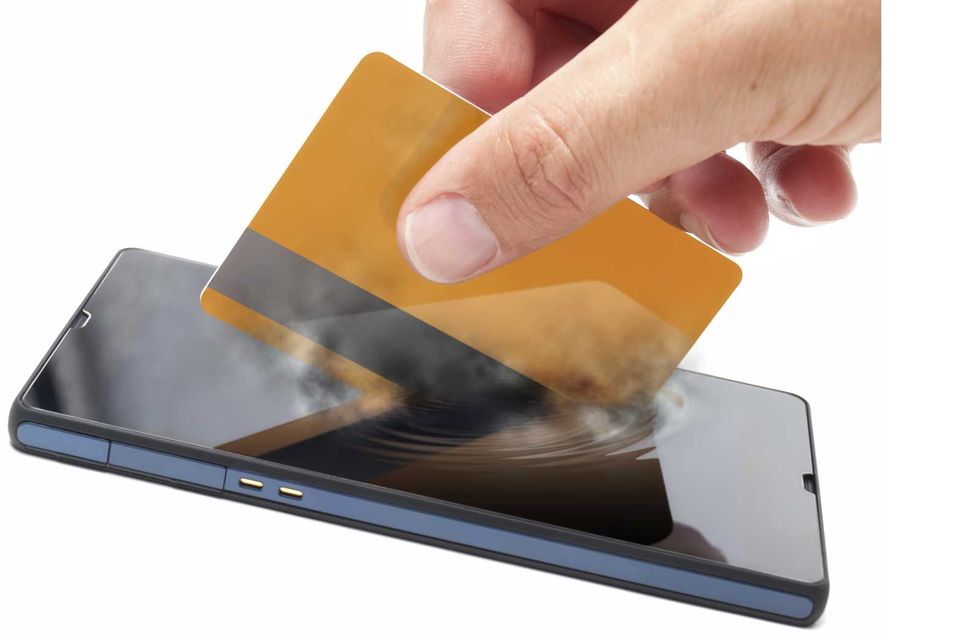Why it still doesn't pay to use mobiles at the tills
Mobile payments. Photo: Thinkstock
How many of us are willing to replace our physical wallets with our phones? This is a question that has sucked billions of euro out of the technology and financial industries. And most of it has been down a black hole.
The basic concept is tantalising. We all have smartphones now. We buy things using our smartphones (Argos says 20pc of its online sales are now from mobile devices). And there are dozens of technology platforms set up for us to use our phones as wallets.
So why aren't we buying our morning coffees with our phones?
Why aren't we paying our bus or train fares using our handsets? Why do we need scrunched up banknotes to buy a round of drinks on a Friday night?
On one level, it's baffling. We have Google Wallet. We have iTunes. We have Paypal and Stripe and Square and Near Field Communications. We have O2 Money and instant McDonalds payments and Starbucks and Realex Fire. We have quad-core smartphones with pulse readers, fingerprint scanners and voice recognition technology.
And yet mobile payments are almost non-existent. We still prefer bits of paper or cards protected solely by flimsy four-digit passwords. (Or, in the US, cards that aran't even protected by flimsy four-digit passwords.)
So what exactly is the problem? Is there some fatal flaw with the technology that no one has told us about? Is the financial industry holding us all back with dithering over-standards? Or is it simply that no one wants to pay for things using their handset?
Banks, which might have been expected to partake in the development of such technology, have not been a net addition to the mobile payments mission. The sector's would-be mobile digital standard - banking apps - are clumsy and very slow to use.
And yet there is still no shortage of grandiose statements of intent from senior 'real world' executives.
"In five years' time, everyone on Ryanair will be paying on their mobile," Ryanair chief executive Michael O'Leary told this newspaper earlier this year. "You'll pay for your drinks and snacks with your mobile. You'll upgrade to priority boarding on your mobile."
Is O'Leary right? If Ryanair is planning on accepting Apple iTunes payments at some point, it may come about.
According to reliable industry sources, the world's biggest company is to attack mobile payments in the same way it went after music more than a decade ago. It will reportedly announce a new micropayments system that uses the iPhone as a central tool. And it will do so without any radical new technology. It will simply use its own ecosystem - iTunes, iPhones, biometric access - and add a little current technology (a Near Field Communications chip) to re-invent the wheel.
If anyone can crack this nut, it is probably Apple. There is no other entity out there that people trust more with regard to a payment ecosystem.
So could this be the trigger the mobile payments industry needs? Once Apple proves that it can be done, will Google jump back in with a new emphasis on its own offering?
What about Samsung? And could all of this leave existing payment companies and banks behind? Is Apple's next sideways move as a nascent financial services firm?
If Apple, as reported, is about to add mobile payments to its panoply of services, it might prove to be a very attractive bet for retailers and other customer-facing entities. Their problem has often been the lack of a simple, quick payments mechanism to accept small charges.
It is possible, though, that Apple may not go entirely on its own. Some say that it will partner with either a credit card company or one of the internet's new payments firms.
(On an unrelated matter, Irish online payments firm Stripe is reportedly at an advanced stage of providing Twitter with an in-stream 'buy now' function that will open up the social network to new revenue streams.)
"There has been a lot of false dawns around the issue of mobile payments," Peter Keenan, a Dublin-educated retail and banking industry veteran, recently told me.
"This has been down to the failure of several things, but also because the market wasn't mature enough. Now it's different. 70pc of UK consumers have a smartphone - it's come from nowhere. We're now at a point in time where the ability to execute mobile payments is now mainstream. And I think that's what lots of customers and retailers now want to do."
Keenan heads up a UK-based €35m start-up called Zapp, which is hoping to provide a mobile payments process via banking apps.
Keenan already had an uphill task. Depending on what Apple announces next week, that hill may get even steeper.
Join the Irish Independent WhatsApp channel
Stay up to date with all the latest news















